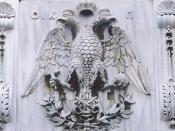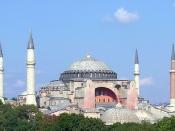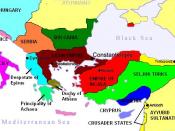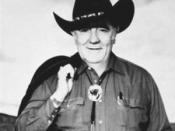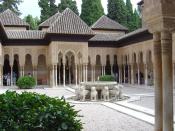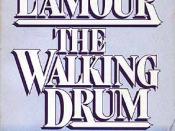The Walking Drum is a novel by author Louis L'Amour. It is a historical novel set in 12th century Europe and Middle East. The main character of the story Marthurin Kerbouchard, goes from city to city in search for his father. During the course of his long journey, he assumes the role of a slave, sailor, scholar, physician, merchant, alchemist, and lover. He becomes a seeker of knowledge and fortune. He stayed in castles, slave galleys, fought bloody battles to rescue a princess, and ultimately ends up in the Valley of Assassins in Persia to rescue his father.
Marthurin was forced to leave his birthplace Brittany to escape Baron de Tournemine who killed his mother. Having no one to protect him, Marthurin took a passage in a ship only to discover he was a slave there. But, because of his sailing experience he became a pilot and freed the fellow slaves and on reaching the coast made their captives slaves.
On reaching Moorish Spain, he started a search for his father. He finds himself in political intrigue, and gets imprisoned. On escaping, he gets aid from a woman Safia who tells him that his father might be alive in the Valley of Assassins in the fortress of Alamut. She found out that his father was captured as a slave by Sinan and told Marthurin it is nearly impossible to even enter in the valley. Safia and Marthurin had to leave Spain because their lives were threatened. So, they joined a merchant caravan which stopped at places for fairs. The caravan stopped at Brittany and by now Marthurin was a full grown man. He took revenge of his mother's murder and killed Baron de Tournemine. The caravan then made their journey to Russia. They had the biggest battle in which all the caravan merchants got killed and Marthurin was seriously injured. On reaching Byzantium dressed in rags, he took a job as a storyteller. By telling stories of lands that he had travelled, he earned a few gold coins. He also learned to be an alchemist, thinking he might get an invitation from Sinan, who was also an alchemist. He did get an invitaion and he entered the valley. He started his journey with an old friend whom he met in Byzantium. When they stopped at an inn he sees a woman from India. Her name was Sundari. He realizes that she is his true love and promises her that if he gets back alive from the valley, he would come to India and marry her. After staying there a few days he finds his father and both escaped by very difficulity. Unfortunately there reunion after so many years was for a short time because Marthurin's destination was in India and his father wanted to get back to sea where he will spent his life. So, they parted and Marthurin starts his long journey to India.
Although this book is a fiction, it mentions a lot of true segments. The segment about Moorish Spain was a fact. They were Arabs from North Africa, called Moors, and conquered Spain in 710-712. The book referred to Constantinople and its geographic location. It referred to the city to be the crossroads between Europe and Asia. It was protected by eleven gates, and it lay between the Sea of Marmora and the Golden Horn, separated by Bosphorus from Asia. The book referred to India as Hind and that is what it was called then. It also mentioned all of the Crusades. It talked about Islam and Arab art. It mentioned the Arab libraries and how many manuscripts lie there unknown to the mosques or Muslims. It also mentioned the Muslims calling the Christians and Jews, People of the Book. When Mathurin reaches Constantinople, Manual I was the emperor of the eastern Roman Empire, or the Byzantine Empire. Another character in that story is Manual's cousin Andronicus, who was the enemy of Mathurin and Manual. This is actually a fact and after Manual's death, Andronicus becomes an emperor and the mob turned on him, and he died even though the book didn't really mention this part. The Assasins were members of an Isma'ili sect, now an important and honorable sect with many members in Pakistan. The fortress of Alamut is in ruins today in the remote corner of Elburz Mountains in Iran. It was destroyed by the Mongols. There was not a lot of fiction in this story. Some of the characters were made up. Also the book generally shows that Marthurin prefers the religion of Islam better than Christianity. For example, he talked about the cleanliness in Muslim world. Talked about how Christians never used to bath or clean themselves. During bad times he would take the name of Allah and he himself changed his name into ibn-Ibrahim, when he was in Constantinople. When he was in Paris, scholars were not regarded with respect, but when he was in Cordoba, which was a Muslim city, he was given great respect for his intelligence.
This book is something that can't be put down. One can read this story in two days, the most. It is filled with so much adventure that the reader just wants to know what happens next. It is very addictive. The period detail and the journey from one place to another were fantastic. It was an occasion where one might even think one has traveled back in time and experienced everything. The best parts of the book are the wonderful descriptions of Muslim Spain and the section inside the Assassins' stronghold. This book really deserves a five-star.
The author, Louis L'Amour has probably done a lot of research before he wrote this book. It has so many vivid descriptions about the lifestyle, the customs, and the fashion of all the places Marthurin had traveled. The story brings about one adventure, conflict and romance after another. The story's hero, Marthurin is perhaps too ideal, being a warrior, scholar, theologian, medical specialist, and ladies man, but he does suffer defeats and routs. He always finds his way to get back on top and outface his enemies of which he makes many. The story builds steam to the climax and leaves the reader wanting more. The story was left off when Mathurin starts his travel to India to marry Sundari. Unfortunately, there could not be a sequal to this story because Louis L'Amour died. But, this book is still worth reading.
Bibliography:Louis L'Amour, The Walking Drum, 1999, USA, Bantam Books, Pub date 31 May 1999, paperback
